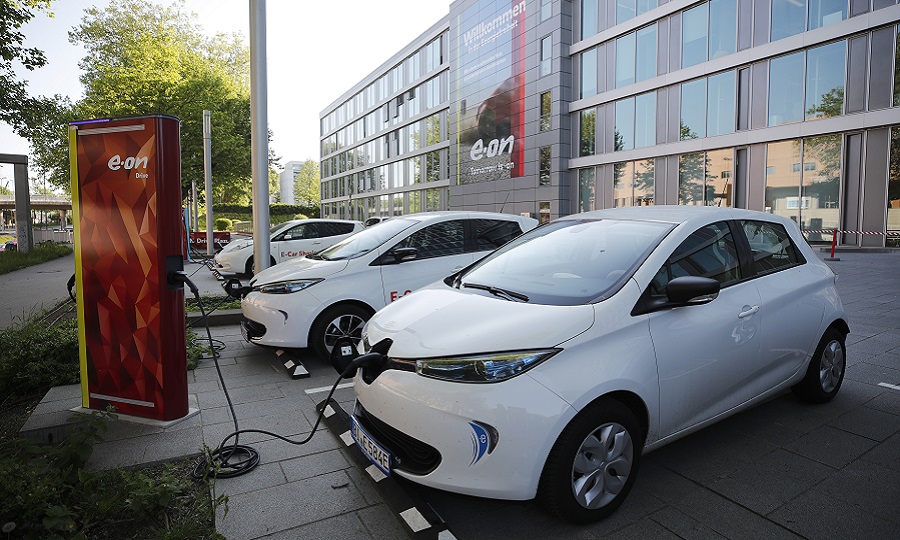
How long to charge an electric car can vary greatly depending on the type of car you own, the battery size, and the power source. Some cars only take a few minutes while others take many hours. It is generally not difficult to estimate how long it will take to charge your car. The following factors will affect the charging time for your electric vehicle: Your power, battery size, temperature, charging station and distance between your home and charger.
The power source is the biggest determinant of how fast an electric car can charge. The power source is the biggest determinant of how fast your electric car can charge. A larger battery will require a longer charging process. Typically, an EV with a 60 kWh battery pack will take about sixty hours to recharge. It will take around thirty-five to fill an 85-gallon tank.

The time to charge an electric car also depends on your state of charge. The temperature between 20-25 degrees Celsius is the most efficient for charging an electric vehicle. If the temperature is cold, charging will take longer. However, charging will take less time if temperatures are warmer.
The charging time for your EV will depend on many other factors. You need to take into account the size of your battery. However, it is also important to think about how fast your charging station works. A DC fast charger can be very fast, recharging 80% of your battery in about 30 minutes. The reverse is true for a standard 3-prong plug. It can take up to one day to fully charge a fully charged battery.
As a general rule, if you plan to travel for more than one-day, a Level 2-public charging station is a good option. A Level 1 connector can only provide a 1 or 2-kW charge. A Level 2 charger on the other side can offer a much higher electricity rate. In just 35 minutes, a 50kW rapid charger can add 100 miles to your vehicle's range. While it may not be as fast as filling up with gas, it is still a convenient way for you to recharge your car.
In most cases, a EV takes between eight and fifteen hours to fully recharge. This includes the initial charging, which should take between twenty-five and thirty minutes. It is important to note that your car's ability to fully charge itself will be affected by the speed of charging, temperature, and environmental conditions.

For most EVs, the optimal charging time is based on the following calculations: (a) your battery's capacity divided by your onboard charger's power rating; (b) the losses you experience as the battery charges. You can get a more reliable and accurate estimate by adding ten percent to the formula. The following formula will calculate a reliable charging time: (c) Your battery's current state of charge.
FAQ
Is being a mechanic apprentice hard?
Although it's not an easy task, you will learn quickly and have many opportunities to advance.
You must be patient and persistent. You must also know how to fix cars, trucks, and motorcycles.
Customers and relatives can exert a lot on you. But, you shouldn’t be pressured to make any decisions you aren’t happy with.
It could be a great job choice if you love fixing cars. It is a job you can get a decent salary for and help build your business.
But you may prefer another path. If this is the case, you might want to become a technician.
This requires you to use your technical expertise in support of other workers. This could be a way to help technicians with their problems or to teach them new techniques.
Another option is to become a service advisor. When customers bring their cars into a garage, they will receive advice and assistance.
Your decision depends on what you want to do. There are many options to choose from, and it is up to you which one suits you the best.
What type of job is there for a car mechanic?
For car mechanics, there are three main areas for employment:
-
Automotive repair shops
-
Dealerships
-
Independent garages
Automotive repair shops
This is the place most people begin to consider becoming mechanics. In fact, it's probably the easiest way to get started. You can either work at a shop owned by someone else or set up your own business.
If you are interested in working at a shop you will need to apply for membership to a union. After you are accepted to the union, you will receive training from it.
You'll be ready for work once you have completed the training.
If you decide to open your own garage, you'll need to register with the government. After you register, you will be required to meet specific standards.
You will receive a license to run your garage once you have registered.
You can sell spare parts or do minor repairs with your license. It won't allow you to fix major engine problems.
As well as selling spare parts you will need to offer advice and direction to customers.
Dealership jobs
Many dealerships have mechanics who are experts in one particular area. For example, they might only deal with brakes or only replace tires.
However, dealerships may also employ general mechanics who are able to handle all aspects related to car repairs.
These positions may require applicants to complete specific training before being allowed on the job. This allows employers to pick the right candidates for their jobs.
Some dealerships even recruit graduates straight from university. These graduates are familiar with the fundamentals of mechanical engineering so they can easily learn about cars.
Independent garages
Independent garages don’t have to be associated with any particular dealer. Instead, they tend to focus on providing high-quality service.
Independent garages don't have to be associated with any particular company. This allows them to offer higher wages. Because these jobs don't have to be associated with any company, they can generally offer better wages than dealerships.
Independent garages can be just as good places to work, but this does not mean they are better. Many business owners prefer to own their businesses and not delegate the responsibility to others.
You might find yourself working long hours but having no control over what happens in the day.
Additionally, you should expect to earn lower wages if employed by a dealership.
You can switch jobs easily. Ask your employer if you would like to work as a mechanic at a dealership.
Or, if your dream is to work for an independent garage you can contact the owner directly.
Finding a new job is not always easy. There are many factors that affect how much you make.
Consider, for example, what type of vehicle you are repairing and whether additional labor charges will apply.
What is the length of an automotive training course?
A course in automotive lasts three years.
The first year focuses on theory and learning about cars. The second year is spent on practical training where you learn how to drive, fix engines, and do other mechanical jobs around the car. The last year of your training is spent on practical training, where you learn how to fix real-world problems.
Is being an auto mechanic a promising career choice?
If you are determined to excel, the automotive industry offers many opportunities. Working hard and learning from others is the best way to be successful in this field.
You'll need to have excellent communication skills because you'll spend most of your time talking to customers and other employees. It's important to be flexible and willing to travel. This will make commutes difficult.
Take classes at community colleges or universities if you're interested to work in automotive. Many schools have programs that are specifically tailored for students who are interested in automotive sales, repair, and customer service.
Studying mechanical engineering is an option if you're interested in pursuing a degree. A bachelor's degree can be obtained in four years.
Many companies will also hire graduates right out of school. Therefore, it is a good idea to look for employment while still pursuing part-time studies.
After you have completed your education, you will likely need some training to be able to work as an automotive technician.
You will need to pass the Automotive Service Excellence certification exam. This test covers engine maintenance and brakes as well as suspension.
After passing the ASE exam, you can apply for a National Institute for Automotive Service Excellence license.
Private individuals can have their vehicles repaired with a license. You'll be paid based upon the number of services provided.
Not all states require licensing. If you intend to work in another state, however, you will need a license.
Some states will not issue licenses until an individual has completed certain training. If this applies to you, then you may need to find another option.
What does it matter which college I attend?
You're wrong. There are no differences between colleges when it comes to getting into the automotive industry. However, some schools offer better programs than others so if you're looking for something more specialized, look elsewhere.
Statistics
- 52% of Mechanics in the United States think their salaries are enough for the cost of living in their area. (indeed.com)
- Apprentice mechanics earn significantly less hourly than mechanics who have completed training, with a median wage of approximately $14.50 an hour, according to PayScale. (jobhero.com)
- The U.S. Bureau of Labor Statistics (BLS) reports that the job outlook for automotive service technicians and mechanics is expected to decline by 4% from 2019 to 2029. (indeed.com)
External Links
How To
How to be an Automotive Technician
An automotive technician is responsible for vehicle maintenance and repair. He/she works at automotive shops, garages or service centers. He/she works with customers to repair their cars and trucks, ATVs or snowmobiles. An automotive technician must have the ability to quickly diagnose and fix problems.
A person who wants to work as an automotive technician should first obtain an associate degree from a vocational school. After completing the program, he/she must pass ASE certification. ASE stands as American Society of Mechanical Engineers. The ASE certification test consists of two sections. One section tests mechanical knowledge; the second section tests practical skills. To pass the test, you will need to visit an authorized testing location. These locations can be found online, or by contacting your local car dealer.
After passing the test, a candidate must pass a state examination before becoming licensed as an automotive technician. This process can vary depending on where the applicant lives. Some states require that candidates attend training courses, while others permit them to learn independently. Some states require technicians to be licensed immediately upon receiving their license. Other states wait until they have been employed as automotive technicians for at least six month.
To get started as an automotive technician, a person should apply to a local automotive dealership. Most new employees begin as apprentices once they are hired. Apprenticeship programs typically last three to four years. During this time, a student learns how to perform basic repairs, such as changing oil, adjusting brakes, replacing tires, cleaning spark plugs, inspecting engine compartments, and performing routine maintenance. Some students learn how to do advanced repairs, such as installing air filters, replacing shocks, repairing engines, and replacing transmission fluids. Classes are offered by most schools during regular business hours. Some schools also offer evening classes, if necessary.
Once a student is done with his/her apprenticeship he/she can become a master journeyman. Journeymen typically spend four to five years learning how to install major systems, such as transmissions, differentials, steering gear, suspensions, and drive shafts. They learn how to do complex repairs such as remanufacturing engines, rebuilding transmissives, and troubleshooting electronic components. Many employers prefer hiring journeymen because they know the job well and understand what the customer expects.
If a candidate successfully passes the required exams and receives a license, he/she might want to consider starting his/her own shop. According to Bureau of Labor Statistics (2010), almost 1.7million automotive mechanic jobs were on the market. That number was expected to grow by 18 percent from 2009 to 2020. When a candidate plans to open his/her own shop he/she should be ready to invest thousands of dollars in equipment.
The salary for an automotive technician depends on several factors, including the type of employer, location, education level, and experience. On average, an unemployed person could earn $20,000 annually. An individual with a high school diploma can earn about $21,000 per annum. Earnings for those with an associate's diploma are approximately $24,000/year. Technicians with a bachelor's degree earn about $27,000 per annum. Master's degree holders make around $32,000 annually. Salary increases can be common. A professional who earns less that $30,000 today could reasonably expect a $40,000 increase in the next few decades.